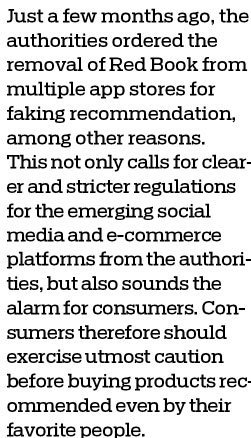Beware of recommendations for cosmetics
Today, if a girl wants to buy a new lipstick, she won't have to sift through a sea of products pompously lined on the shelves of stores in malls or standalone shops looking desperately for the one with the most familiar name thanks to the advertisement she happened to catch on TV the day before - like I did a decade ago. She would instead check on Red Book, an app with about 200 million users, among which are a large number of online celebrities and beauty bloggers, for recommendations and lipstick assessment notes of the beauty influencers they follow.
As the more than 300 billion yuan ($41.94 billion) Chinese cosmetics market further expands - the retail sales grew 13.2 percent year-on-year in the first half this year alone - more and more cosmetics consumers, mostly millennials, are increasingly swayed by beauty influencers online who make a living by recommending make-up products. As a result, China is witnessing the phenomenon of zhongcao (strong longing for certain product thanks to someone's recommendation), leading to huge sales of "blast products" promoted by beauty bloggers.
Behind this seemingly blind loyalty of consumers to these online key opinion leaders is a change of landscape in both contemporary life and consumer behavior.
















